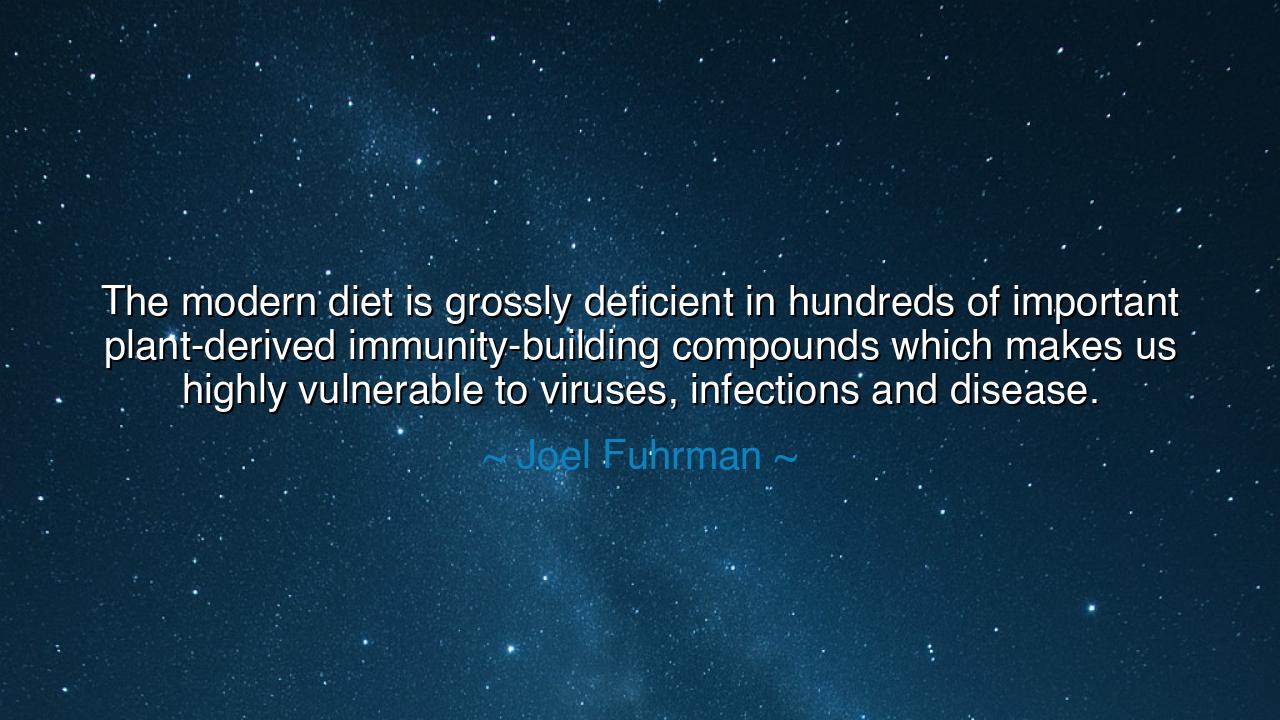
The modern diet is grossly deficient in hundreds of important
The modern diet is grossly deficient in hundreds of important plant-derived immunity-building compounds which makes us highly vulnerable to viruses, infections and disease.






"The modern diet is grossly deficient in hundreds of important plant-derived immunity-building compounds which makes us highly vulnerable to viruses, infections and disease." – Joel Fuhrman
In this solemn yet stirring warning, Joel Fuhrman speaks as both healer and prophet, calling humankind to awaken from its slumber of excess. His words rise like an ancient oracle, lamenting how far we have strayed from the wisdom of the earth. He reminds us that the modern diet, filled with processed grains, sugars, and animal fats, has severed us from the living nourishment that once flowed directly from soil to soul. Once, our ancestors ate from the bounty of nature—leaves kissed by rain, fruits ripened by the sun, roots that carried the memory of stone and season. Now, we eat from machines. In trading the living for the lifeless, we have silenced the chorus of plant-derived compounds that once strengthened our defenses, the immunity-building forces that nature gifted freely to protect the body’s sacred harmony.
The origin of Fuhrman’s teaching lies in the recognition of what time and comfort have cost us. For millions of years, the human being evolved in communion with plants. The forest, the meadow, the field—all were our pharmacy, our nourishment, our sanctuary. The early hunter-gatherers did not merely eat; they partook in creation itself. Every berry, every herb, every green leaf was alive with phytochemicals, the unseen warriors that guarded the body from illness and decay. But in the age of industry, when convenience became the new god, this covenant was broken. The vibrant variety of nature’s offerings was replaced with the monotony of refinement—white flour, white sugar, and the pale imitation of food stripped of its living essence. In this loss, our bodies forgot how to defend themselves.
Even the ancients knew that health was born not of abundance but of balance. The Chinese sages taught that the body’s strength flowed from harmony with the elements—wood, fire, earth, metal, and water. The healers of Greece, following Hippocrates, prescribed not potions but plants. “Let food be thy medicine,” he said, understanding that within the humble leaf lies the power of restoration. They knew what Fuhrman now reaffirms: that nature, in her infinite wisdom, wove into the fabric of plants the very compounds that sustain life and shield it from harm. When we abandon her gifts, we invite sickness not by fate but by neglect.
Consider the tale of scurvy, the ancient sailor’s curse. For centuries, men crossed oceans in search of gold and glory, yet perished by the thousands from weakness, fever, and bleeding gums. The cause was simple—the absence of fresh fruits and vegetables, the deprivation of vitamin C, one of nature’s own immunity-builders. When at last they learned to carry lemons and limes aboard, the disease vanished as swiftly as it came. This is a parable for our own time: though the sea has changed to supermarkets and the ships to cities, humanity still suffers from a quiet scurvy of the spirit—a poverty of living nourishment amidst material plenty.
Fuhrman’s message burns with the fire of truth: our vulnerability to viruses, infections, and disease is not the punishment of nature, but the consequence of disconnection. The body, deprived of its natural allies, grows weak and fearful. The immune system—our inner army—depends upon the presence of the compounds that once flowed daily into our blood from green plants, berries, herbs, and seeds. Without them, we are like a fortress without walls, exposed to every passing storm. We may build great machines and mighty cities, yet the smallest microbe can humble us when we forget the roots that once sustained our strength.
But there is redemption in remembrance. To eat as Fuhrman teaches is not merely to diet, but to return—to live once more in harmony with the rhythm of the earth. The act of consuming plants is sacred; it is the renewal of a covenant broken by forgetfulness. In every salad, in every piece of fruit, lies the echo of ancient power—the same power that sustained the first humans and will sustain the last. By returning to a plant-based foundation, we rekindle that alliance with the natural world. The body does not need conquest; it needs communion.
The lesson, then, is as simple as it is profound: return to the living foods of the earth. Let your plate be a garden, not a factory. Fill it with color—the greens of vitality, the reds of protection, the yellows of energy, the purples of renewal. Eat with gratitude, not haste. Every bite of living food is an act of healing, a step toward wholeness, a rebellion against the decay of the modern age.
So let these words of Joel Fuhrman be carried forward as both warning and promise: when humanity forgets its roots, the body falters; when it returns to them, it thrives. The immunity-building compounds that dwell within plants are the silent guardians of life, waiting to be welcomed home. To honor them is to honor ourselves—to reclaim the ancient bond between flesh and field, between humankind and the living earth. And in that remembrance, we shall find again the strength, clarity, and resilience that have always been our birthright.






AAdministratorAdministrator
Welcome, honored guests. Please leave a comment, we will respond soon